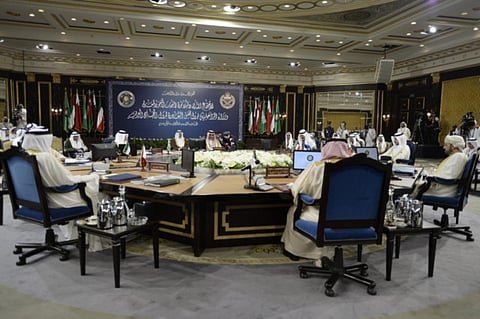Unified GCC police to tackle crimes that threaten region
Interior Ministers approve proposals to target Hezbollah activities and interests

Manama: A unified Gulf Cooperation Council (GCC) police has been approved by the Gulf interior ministers.
The police force would be similar to the Interpol and Europol in fighting crime and deterring threats, GCC officials said in Manama where the ministers held their 32nd meeting.
“The purpose of having the unified police is to achieve greater coordination and better information sharing between the GCC countries,” Abdul Lateef Al Zayani, the GCC secretary-general, said. “There will be tasks similar to those of the Interpol, such as focusing on crimes that threaten the region, mainly organised and transnational crimes. There will be coordination with Interpol as an international agency,” he said.
The unified police move will be referred to the GCC leaders at their summit in Kuwait City next month.
The GCC, established in Abu Dhabi in 1981, comprises Bahrain, Kuwait, Oman, Qatar, Saudi Arabia and the UAE.
The ministers also endorsed all the recommendations put forward by their undersecretaries on “tackling the activities and interests of Hezbollah in the Arabian Gulf,” Al Zayani said.
In June, the GCC unanimously declared the Lebanon-based Hezbollah a terrorist organisation and said that it would take measures against its interference in the Gulf countries.
“There were several recommendations from the GCC countries and they were all endorsed by the ministers,” Al Zayani said on Thursday in Manama.
Iran deal
The GCC chief said that the member-countries welcomed the interim deal between Iran and the world powers for the sake of security and stability in the region.
“The GCC stance is very clear as all countries welcomed the agreement. In fact, any effort to ensure security and stability is welcome. The agreement will be closely monitored, and we hope that it becomes a reality on the ground,” he said.
Bahrain’s interior minister Shaikh Rashid Bin Abdullah Al Khalifa earlier said that the GCC countries were expecting clarifications and assurances on the deal.
“The initial agreement between the Iranian republic and the big powers on its nuclear file makes us expect from these states to clarify to the leaders and people of the region that the agreement that has been reached serves to achieve regional security stability,” he said as he addressed the meeting of the GCC interior ministers. “The agreement must not be at the expense of the security of any member of the Council. It is not a secret that we in Bahrain have felt threats with foreign-related links to our security.”
Shaikh Rashid said that Bahrain had to deal with “biased and unfair positions from some organisations and media who under the guise of human rights and freedom of expression attempted to tarnish the reputation of Bahrain.”
“I can tell you openly and clearly that whoever wants to get into the Gulf through Bahrain must understand that Bahrain is the Gulf and that the Gulf is Bahrain.” Al Zayani said that the issue of the expatriate workers’ status following the clashes in Saudi Arabia had not been taken up by the interior ministers.
The meeting focused on the GCC police, the required measures to tackle the interests of Hezbollah in the region and other security issues, he said.
Sign up for the Daily Briefing
Get the latest news and updates straight to your inbox



